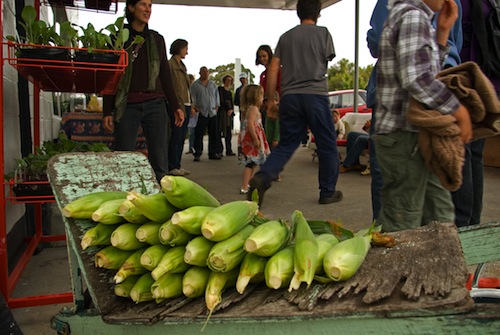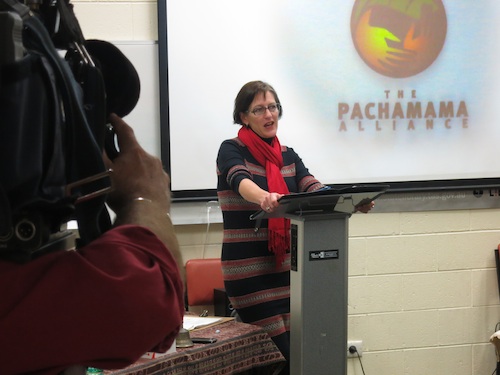On the question of sustainability, some Tasmanians are well ahead of the game. [25 September 2012 | Peter Boyer]

Getting ready for the Channel Living food market. PHOTO PHILLIP HURST
As you read this, chances are that somewhere in Tasmania the Transition movement is working on your behalf.
It might be people texting, emailing or talking on the phone or over the fence. They might be drumming up support for the next local festival, monthly communal feast or food market day, or arranging bulk purchase of insulation or solar panels, or a community gardening roster.
They might be planning a “Be the Change” forum or a traditional skills workshop, or organising a visiting speaker, or lobbying for safer pedestrian and cycling facilities, or agitating for electricity supply systems that monitor usage and reward frugal users.
Or they might be discussing a whole new way for our communities to operate — things like visionary plans for towns and transport systems, or local currency for local needs, or new ways we can grow and distribute food, or generate and conserve energy.
You may not have asked them to — you may have no idea what I’m talking about — but it’s happening, and even if you’re content to keep your distance for now, one day you’ll have reason to thank the Transition people for their efforts to improve the lives of all Tasmanians.
Right now, Transition has a very low public profile in Tasmania. This is no Coles or Woolworths or Harvey Norman. It’s not a political party, so no-one is out there spruiking for your vote. There are no big signs or structures, no billboards, no television, newspaper or internet ads.
But it’s here, and it’s not going away. It’s actually getting bigger as people become more aware that with each passing year our human footprint is getting heavier, the need to reduce it more pressing, and the range of opportunities for turning things around more constrained.
Beginning in Totnes, UK, in 2005, as a response to signs of growing energy constraints and an emerging climate crisis, Transition has spread to thousands of communities on all continents.
The informality and local focus of Tasmania’s Transition movement makes it hard to keep a handle on how it’s progressing here. One thing is certain: it’s growing. Estimates of the number of groups vary from 20 to over 30, with new groups appearing frequently.
This is no simple, straightforward, stage-managed march to a better future. While the Totnes Transition model is a widely-accepted basis for action, these initiatives don’t follow a prescribed, tick-box format with a specific outcome.
Instead, they offer something much more interesting. Organisation is from the grassroots. If they’re able to make the effort, any one person can have a big say in how the movement will function and what it will focus on in their locality. Interesting, but also problematic.
Voluntary work keeps communities ticking, but it takes effort. We are beset with the need to support ourselves and our families, which means that besides bringing up the kids most of us must go to work and do what’s necessary to please our bosses and keep our jobs.
That can leave little time or energy for other things, no matter how important. What makes it tougher is a chronic failure of government to provide the support needed to turn sustainability initiatives into something with real impact in the community.
Our dependence on car transport, for instance, is a very hard beast to shift. We see affordable petrol as a right, not a privilege, so politicians avoid drawing attention to Tasmania’s oil price vulnerability, subject of a review completed a year ago that the government is still sitting on.
It’s clearly in all Tasmanians’ interests to plan for higher petrol prices as peak oil’s impact begins to bite, just as we should know about impending electricity and water price rises. But bad news tends to be badly received, so politicians remain silent and sit on their hands, and the general public remains in the dark.
Without a big shift in the public mood, Transitioners are up against it. As Climate Action Council member Nick Towle says, “trying to jump to an inspiring conversation about changing our transport infrastructure seems quite odd to many who are unaware of the predicament we’re all in.”

Climate Change Minister Cassy O’Connor launches the government’s ClimateConnect and Earn Your Stars grants programs for 2013.
Yet it’s not such a leap to accommodate new ways of doing things, if only we put our minds to it. Building more resilience into our communities isn’t just a response to some vague unease about where we’re headed, but a real enhancement of our personal and collective lives.
Rachel Roddam, a leader of Tasmania’s Transition movement, puts it this way: “If Transition had its own reality show on commercial TV we’d soon have a great following. Many people out there are ready to act, to connect with other people and create their future.” They just need to know how.
Food is always a drawcard. Roddam’s Molesworth group now manages a monthly community feast, and the Woodbridge-based Channel Living has hundreds of paid-up members supporting a thriving local food cooperative. Here, sustainability is starting to gain real traction.
Building a self-sustaining business from Transition is Andrew Olivier’s aim: a web-based Centre for Transition aiming to run study programs in such subjects as personal transition, permaculture and creating local economies. For more information, email info@centrefortransition.org
Not all of government is ignoring Transition. Early this month, Climate Change minister Cassy O’Connor launched new rounds of two grant programs focusing on adapting to climate change, cutting carbon emissions and saving energy. Details are at the Tasmanian Climate Change Office website.
To find out more about Transition, search for “transition Tasmania” in Google.
